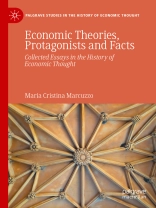This book brings together the work of Maria Cristina Marcuzzo and highlights her investigations into the history of economic thought and her quest for an alternative economic thinking. Following an extended introduction that contextualised her ideas and highlights consistent themes throughout the volume, it discusses the theoretical and methodological approaches that have come to define the history of economic thought as a discipline. The work of David Ricardo is then debated, alongside ideas of money and monetary systems. Finally, the impact of the Cambridge economists is presented, with a particular focus on Luigi Pasinetti, Joan Robinson, Piero Sraffa, and John Maynard Keynes.
This book combines theoretical discussions with historical analysis, biographical narratives, and original archival researcher to provide rich insights into the history and impact of economics. It will be of interest to students and researchers working within the political economy and the history of economic thought.
สารบัญ
1. Introduction.- Part I: History of Economic Thought: Which are the Issues.- 2. Is History of Economic Thought a ‘Serious’ Subject.- 3. A Slender Trunk and Many Branches: The History of Economic Thought in Perspective, Past and Future.- 4. A Methodological Agenda for New Economic Thinking.- 5. Is History of Economics What Historians of Economic Thought Do? A Quantitative Investigation.- Part II: Ricardo, Money and Monetary Systems.- 6. Ricardo’s Theory of Money Matters.- 7. On the Notion of Permanent and Temporary Causes: The Legacy of Ricardo.- 8. Profitability in the International Gold Market in the Early History of the Gold Standard.- 9. Metallic Standards and Real Exchange Rates.- Part III: Cambridge Economics: Past and Present.- 10. Is There a Cambridge Approach to Economics?.- 11. Luigi Pasinetti and the Cambridge Economists.- 12. The “Cambridge” Critique of the Quantity Theory of Money: A Note on How Quantitative Easing Vindicates It.- 13. Dear John, Dear Ursula (Cambridge and LSE, 1935): Eighty-Eight Letters Unearthed.- Part IV: Cambridge Protagonists: Keynes, Joan Robinson and Sraffa.- 14. On Alternative Notions of Change and Choice: Krishna Bharadwaj’s Legacy.- 15. Sraffa and His Arguments Against ‘Marginism’.- 16. Joan Robinson’s Challenges on How to Construct a Post-Keynesian Economic Theory.- 17. Fighting Austerity: Why After 80 Years the General Theory is Still Relevant Today.
เกี่ยวกับผู้แต่ง
Maria Cristina Marcuzzo is Honorary Professor of Political Economy at the University of Rome, “La Sapienza’, and Fellow of the Italian Academy of Lincei. She is a former President of the European Society for the History of Economic and the Italian Society for the History of Political Economy. She is also a Distinguished Fellow and Vice President of the History of Economics Society.












